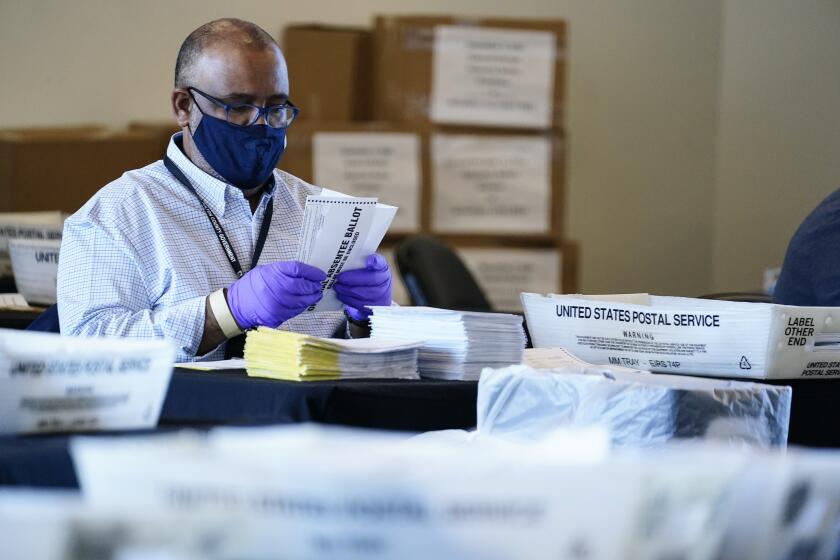Man at center of Texas Atty. Gen. Paxton’s impeachment charged with lying to get loans

- Share via
AUSTIN, Texas — A Texas businessman at the center of the scandal that led to the historic impeachment of state Atty. Gen. Ken Paxton was charged Friday with making false statements to mortgage lenders to obtain $172 million in loans.
The federal indictment of real estate developer Nate Paul is the result of a years-long FBI investigation — a probe Paxton involved his office in, setting off a chain of events that led to a separate federal probe of the attorney general and his impeachment and suspension from office last month.
Paul was charged with eight counts of making false statements while seeking loans from mortgage lenders in the U.S. and Ireland. There was no mention of Paxton or the attorney general’s office during the hearing.
Paul, 36, who entered the federal courtroom shackled and wearing jeans, a blue shirt and sneakers, did not enter a plea during his initial appearance in an Austin court and did not visibly react as the charges were read. He was released ahead of trial but ordered to surrender his passport and inform the court of any travel outside Texas.
Following the hearing, Paul left through a back door and climbed into a car in a gated area outside the courthouse.
Paul is “adamant that he is not guilty,” defense attorney Gerry Morris said after the hearing, adding that he did not know when his client last spoke with Paxton. An attorney for Paxton, Dan Cogdell, had speculated Thursday evening that prosecutors might use the charges against Paul to try to get him to “flip” and cooperate in the investigation of the attorney general.
Paul is accused of overstating his assets and understating his liabilities while seeking loans in 2017 and 2018, including by giving a financial institution false and counterfeit records. In one case, prosecutors said, Paul told banks he had $18 million in an account when he had less than $13,000. In another case laid out in the 23-page indictment, Paul is accused of having $28 million in liabilities but giving a credit union in 2018 a far lower number.
FBI agents examining Paul’s troubled real estate empire searched his Austin offices and palatial home in 2019. The following year, eight of Paxton ’s top deputies reported the attorney general to the FBI on allegations of bribery and abusing his office, including for hiring an outside lawyer to examine the developer’s claims of wrongdoing by federal agents.
The allegations by Paxton’s staff prompted an FBI investigation that in February was taken over by the Justice Department’s Washington-based Public Integrity Section. They are central to 20 articles of impeachment overwhelmingly approved by the GOP-led Texas House of Representatives. They include abuse of public trust, unfitness for office and bribery.
The coming impeachment trial for Texas Atty. Gen. Ken Paxton has a twist: His wife, a state senator, could vote on whether he is impeached.
The impeachment accuses Paxton of using his office to help Paul over his unproved claims of an elaborate conspiracy to steal $200 million of the developer’s properties. The bribery counts say that in return the developer employed a woman with whom Paxton had an extramarital affair and paid for expensive renovations to the attorney general’s million-dollar Austin home.
Paxton’s lawyers sought to rebut the latter claim this week by releasing a bank statement that included a 2020 wire transfer purportedly showing Paxton, not a donor, paying more than $120,000 for a home renovation. But the document raised new questions about the men’s dealings.
The wire transfer was dated Oct. 1, 2020 — the same day Paxton’s deputies signed a letter informing the head of human resources at the Texas attorney general’s office that they had reported Paxton to the FBI.
The $121,000 payment was to Cupertino Builders, whose manager was an associate of Paul’s, state corporation and court records show.
The company did not incorporate as a business in Texas until more than three weeks after the transaction took place. A company of the same name was formed in Delaware in April of that year, although public filings there do not make clear who is behind it.
Texas has sued the U.S. government for ordering a temporary halt to most deportations of undocumented immigrants, the first major lawsuit challenging Biden’s policies.
Paul has faced numerous lawsuits from creditors and business partners over the years, with several of his companies filing for bankruptcy or being placed under the supervision of court-appointed overseers. Last year, one of those receivers wrote in a report that Cupertino Builders was used for “fraudulent transfers” from Paul’s business.
Paul has denied bribing Paxton. The attorney general has also broadly denied wrongdoing and said he expects to be acquitted during an impeachment trial in the state Senate, where his wife is a member.
Texas AG’s lawsuit is like a football team down by 25 points with 15 seconds to go launching a Hail Mary pass from its own end zone.
The Senate will set its own rules for a trial that has little precedent, given that Paxton is just the third sitting official in Texas history to be impeached. The proceeding is set begin no later than Aug. 28.
Paxton was separately indicted on securities fraud charges in 2015, though he has yet to stand trial.
News Alerts
Get breaking news, investigations, analysis and more signature journalism from the Los Angeles Times in your inbox.
You may occasionally receive promotional content from the Los Angeles Times.
More to Read
Sign up for Essential California
The most important California stories and recommendations in your inbox every morning.
You may occasionally receive promotional content from the Los Angeles Times.













